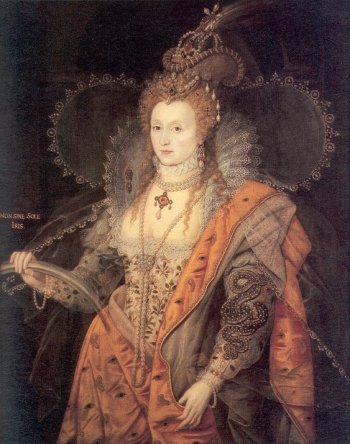For some sort of bizarre reason we thought it sensible to give our allegiance to the king, our fealty to the Pope, and our deference to those of bluer blood and larger stacks of cash.
The innate idiocy of this can be readily recognized by most in at least the free parts of the world today, but I'm not entirely sure we as a society have fully internalized this understanding.
I still see the aristocracy ruling through capitalism, the Church through the way we assess morality using terms like "appropriate", "unnatural" and "vulgar" rather than exclusively equality, and the monarchy through patriotism.

This last point probably needs elaboration. The monarchy doesn't even exist in any real way in the Western world any more.
I think most of us can agree that the reason to support the monarch - if any - was pragmatic rather than romantic or idealistic. A king must rule not because of his "divine right" but because in his absence we'd have anarchy and people would eat each other.
But when you think about it, what more reason do we have to support "the country"? What is "a country" anyway? The land and the people who live on it. To love your country is to love your countrymen and a patch of soil up to some arbitrarily decided line. I'm all for fraternity of man (which is here suffocated into fraternity of citizen), but other than that all the things we get excited about - flag, symbol, anthem - are abstract concepts as arbitrarily invented as the divine right of kings.
This leaves us with ethnic identity - and granted, history, language and culture are not (entirely) arbitrarily invented - but I still can't see how you can love them. I don't even see how you can be proud of them, seeing as you weren't personally responsible for any of them, but never mind that. There's all this love and passion and allegiance going on, and it's unclear whom it's directed towards.
Some would say that it's directed towards your countrymen, but I don't buy that. "Your countrymen" aren't an interested power - they're not the ones who instituted this attitude - that was the government. To love your country is to love your government. Maybe not even this specific incarnation of the government - but the government in general, when it comes into conflict with any out-of-state element, regardless of the legitimacy of the actual claims of either party. You side with the one you love.
Instead of a royal "office" to swear our undying loyalty to, we now have a democratic, rotating bureaucracy to which we do the same thing. What once was justified in the name of "the divine right of kings" can now be justified in the name of "the divine right of nations", and patriotism has become the new royalism.

I realize this isn't being entirely fair, as democracy of itself gives a government incomparably greater legitimacy than any autocracy can hope
for - but what bothers me is the almost holy aura surrounding "national missions". I can accept (reluctantly and tentatively) that a nation might have needs, but to imbue this with quasi-religious, supernatural significance is akin to mistaking the monarch's role of maintaining order for a divine right to do whatever the fuck he wants to the country.
And as for that fraternity of man argument I shrugged off a little too quickly earlier - that seems to me akin to deciding that Church-directed religious coercion is necessary for people to behave decently towards one another. We're not children. We're civil to one another because we have internalized principles of behaviour. We can love each other through understanding we are all brothers - all - not just those within the state borders. Nobody's claiming we're there yet, but the enforced national distinctions certainly aren't helping.
To summarize my point - in what might have been the fifth paragraph of this entry - it seems that in order to be free men and have a chance to advance spiritually, we must free our moral judgement from organized-religious notions like obedience, our politics from knee-jerk chauvinism, and our assignation of value from attributes of money and property.
Where does this leave us? With a Marxist revolution, so it appears. If we are to be free from repression, it's certainly not enough just to go vote every few years. It's not sensible to not be political if you're not completely free. The advantage of living in a liberal democracy is that it allows you to be political at very little risk; not that it erases the need. It may not be strictly necessary to take up arms and revolt, but it becomes patently ridiculous to be even remotely indifferent to political developments.

No comments:
Post a Comment